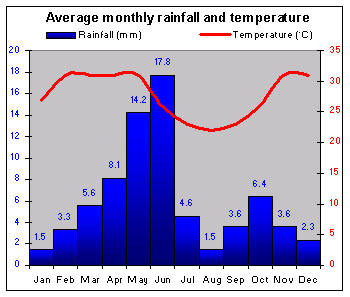COUNTRY INFORMATION |
Introduction |
The heartland of the ancient Ashanti kingdom, modern Ghana is a union of the former British colony of the Gold Coast and the British-administered part of the UN Trust Territory of Togoland. Ghana gained independence in 1957, the first British colony to do so. Multiparty democracy was embraced in 1992, and the handover of power to the main opposition party in 2000 confirmed the shift away from Ghana's recent history of intermittent military rule. |
|
Climate |
 |
Southern Ghana has two rainy seasons: from April to July and September to November. The drier north has just one, from April to September. |
|
People |
| Languages |
Twi, Fanti, Ewe, Ga, Adangbe, Gurma, Dagomba (Dagbani) |
|
| URBAN/RURAL POPULATION DIVIDE |
|
|
|
Ghana contains various cultural-linguistic groups. The largest is the Akan, who include the Ashanti and Fanti peoples. Other important groups are the Mole-Dagbani in the north, Ga-Adangbe around Accra, and Ewe in the southeast. Tribal tensions are rare, but can flare up as in the north in 2002. |
|
Economy |
| GNP (US$) |
6594
|
M |
GNP World rank |
101
|
|
| Inflation |
25 |
% |
Unemployment |
20 |
% |
|
StrengthsGNP rose by 5% a year throughout the 1990s, following economic recovery policies begun in 1983. Second-largest gold producer in Africa. Since 1996, Ashanti Goldfields Co. Ltd. has expanded into a multinational active in 12 African countries. Cocoa production accounts for 15% of world total. WeaknessesHigh budget deficits and debt repayments; the cedi was devalued in 1983 and has since tended to float downward. Foreign investors generally invest solely in gold mining. High inflation levels. |
|
Politics |
| Lower house |
Last election |
2000 |
Next election |
2004 |
| Upper house |
Last election |
Not applicable |
Next election |
Not applicable |
|
Ghana's return to multiparty rule in 1992 marked the legitimization of the military government of Jerry Rawlings. An air force flight-lieutenant of Ewe–Scottish descent and one of the great survivors of African politics, Rawlings staged coups in 1979 and 1981, and led the 1981–1992 Provisional National Defense Council (PNDC) military government. As the NDC candidate, Rawlings won 58% of the vote in the 1992 presidential election. Opposition parties boycotted the following parliamentary elections, which the NDC won easily. Elections in 1996 gave Rawlings a further and final term of office. In December 2000 the opposition NPP gained a historic victory when it stripped the NDC of its parliamentary majority and NPP candidate John Kufuor won the presidency. |
|
Resources |
| Minerals |
Gold, diamonds, bauxite, manganese |
|
| Oil reserves (barrels) |
No data |
Oil production (barrels/day) |
Reserves of 500,000 bbl |
|
Gold production has expanded strongly since the mid-1980s; by 1993, gold had overtaken cocoa as the major export. Diamonds, bauxite, and manganese are also exported. Hydropower from the Volta Dam is exported to Togo and Benin, but is hit by periodic droughts. |
|
Health |
| Life expectancy |
57 |
Life expect. World rank |
144 |
| Population per doctor |
10000 |
Infant mortality (per 1000 births) |
58 |
|
|
|
| Principal causes of death |
Malaria, diarrheal diseases, tuberculosis |
|
The health of most of the population has benefited more from improvements in public hygiene than in medical care. Private health care is available. |
|
Education |
| Literacy |
72 |
% |
Expend. % GNP |
4 |
%
|
|
| PERCENTAGE OF POPULATION IN FULL TIME EDUCATION |
|
| Primary |
79 |
% |
Secondary |
36 |
% |
Tertiary |
1 |
% |
|
All sectors of the education system are oversubscribed. There are a few high-quality boarding schools and four universities. |
|
Wealth |
| Cars |
5 |
per 1,000 population |
| Telephones |
12 |
per 1,000 population |
| Televisions |
118 |
per 1,000 population |
|
Political uncertainty brought few opportunities for advancement, and many Ghanaians emigrated, but the situation is now improving. The main economic disparity is still between the poorer rural north and the richer, more urban, south.
|
History |
In 1874 Kumasi, capital of the Ashanti kingdom, was sacked by a British force to create the Gold Coast colony. - 1957 Independence under Kwame Nkrumah.
- 1964 Single-party state.
- 1966 Army coup.
- 1972–1979 Corrupt "kleptocracy" of Gen. Acheampong. Executed 1979.
- 1979 Flt. Lt. Jerry Rawlings' coup. Civilian Hilla Limann wins elections.
- 1981 Rawlings takes power again.
- 1992, 1996 Rawlings and NDC win multiparty elections.
- 2000 Opposition NPP wins elections; John Kufuor wins presidency.
|
|